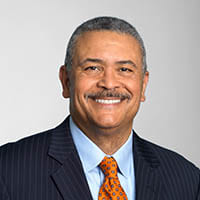June 08, 2021
By Daniel H. Gillison

As the CEO of the National Alliance on Mental Illness (NAMI), the nation’s largest grassroots mental health organization, I saw firsthand how stressful this last year was for everyone. There was a 70% increase in calls to the NAMI Helpline compared to 2019. And the demand for our services only continues to grow.
For me, tennis has been a great outlet to deal with my own stress and anxiety from the pressures of leading a large company, navigating the negative impacts of COVID-19, and witnessing countless acts of police brutality in the news. For Naomi Osaka — a young, Japanese-Haitian woman in a white, male dominated, performance-based profession — it unfortunately became a source of more anxiety and stress due to the requirements surrounding the sport.
So on Monday, referencing the burden media interviews were taking on her mental health, she withdrew from the French Open. And in the last few days, Osaka has been called everything from a social justice champion to a spoiled snowflake. Some have applauded and praised Osaka for her vulnerability, but criticism always has a way of ringing louder.
Having lived the Black experience and been a college tennis player who was introduced to the sport by a chance encounter with Arthur Ashe, I understand at a very small level what Osaka has experienced. I know what it’s like to walk out on a court where the majority of your competition and the people in the bleachers don’t look like you. I know what it’s like to feel the pressure of having to work twice as hard as others. And I know just how hard it can be to speak up about your own mental health when doing so is heavily stigmatized in the Black community, in the athletic community, and in society.
Osaka has had to navigate the duties she feels toward herself and her communities as a professional tennis player, as a person of color, as a role model in the media, and as a young person struggling with her own mental health. I imagine doing so is a bit like trying to hit multiple tennis balls with a single racket. Most of us can’t even consistently hit one.
The truth is that Osaka prioritizing and speaking up about her mental health needs despite peer pressure to do otherwise shows great strength, not weakness. Like all people struggling with mental health conditions, Osaka deserves acceptance, support, and reasonable accommodation — not discrimination, not retaliation, not threats to her career, (which, in the U.S., are illegal according to the Americans with Disabilities Act), not judgment, and certainly not financial penalties.
If Osaka had declined to speak to the media because of a physical health condition, would there even be a controversy? Of course not. Why should our reaction be so much different in response to a mental health condition someone is struggling with — which is just as real and can be just as debilitating?
It’s time for us to stop stigmatizing mental health in our workplaces. It’s time for us to start caring just as much about an athlete’s mental health as we do their physical health. It’s time for us to recognize the toll systemic racism continues to have on people of color’s physical and mental well-being. And it’s time for us to follow Osaka’s example of talking more openly and honestly about the real impacts mental health has in our everyday lives.
After all, 1 in 5 adults in the U.S. struggle with a mental health condition every year, with 1 person dying from suicide every 11 seconds. Mental illness does not discriminate based on gender, culture, race, socio-economic status, popularity, or profession. It does not matter if you are the highest paid female athlete or a top executive working at a national mental health organization. This is an issue we are all affected by. It’s an issue we all have a responsibility to solve.
Osaka may have opened up the conversation, but now the ball’s in our court.
To find a local mental health center for free support and education, visit nami.org/findsupport. To talk to a trained volunteer about how to find inclusive, culturally competent mental health resources, call 800-950-NAMI (6264), email info@nami.org, or visit NAMI.org/help
 Daniel H. Gillison, Jr. is the chief executive officer of NAMI (National Alliance on Mental Illness). Prior to his work at NAMI, he served as executive director of the American Psychiatric Association Foundation (APAF) in addition to several other leadership roles at various large corporations such as Xerox, Nextel, and Sprint. He is passionate about making inclusive, culturally competent mental health resources available to all people, spending time with his family, and of course playing tennis. You can follow him on Twitter at @DanGillison.
Daniel H. Gillison, Jr. is the chief executive officer of NAMI (National Alliance on Mental Illness). Prior to his work at NAMI, he served as executive director of the American Psychiatric Association Foundation (APAF) in addition to several other leadership roles at various large corporations such as Xerox, Nextel, and Sprint. He is passionate about making inclusive, culturally competent mental health resources available to all people, spending time with his family, and of course playing tennis. You can follow him on Twitter at @DanGillison.
Submit To The NAMI Blog
We’re always accepting submissions to the NAMI Blog! We feature the latest research, stories of recovery, ways to end stigma and strategies for living well with mental illness. Most importantly: We feature your voices.
LEARN MORE